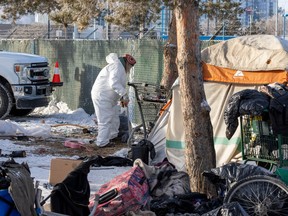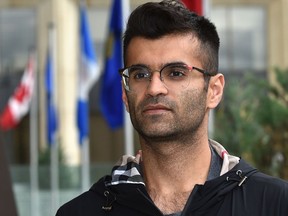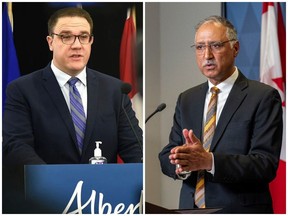The city is hoping to recoup close to 60 per cent of its $42,626 legal bills after an Alberta court dismissed a lawsuit from the Coalition for Justice and Human Rights

Article content
Lawyers for the City of Edmonton were in court Thursday asking an advocacy group for $25,000, partially as a deterrent, to cover some of the money the municipality spent defending the way it removes homeless encampments.
Court of Kings Bench Justice Jonathan Martin has yet to make a decision.
Article content
The city is hoping to recoup close to 60 per cent of its $42,626 legal bills after an Alberta court dismissed a lawsuit from the Coalition for Justice and Human Rights. In January, Martin denied the not-for-profit public interest standing, finding it was not the right group to represent homeless people. He dismissed the case without deciding whether Edmonton’s policy violates the constitutional rights of unhoused people as the advocacy group argued.
Advertisement 2
Article content
City lawyer Cameron Ashmore told the court on Thursday the coalition should cover some costs, partially to prevent this kind of legal action.
“This cost itself is intended to be a little bit of a deterrent,” he said. “If we requested the entire amount, it probably wouldn’t be fair. We are trying to find the line.”
He said the city is willing to cover some of the costs knowing it has more resources to do so, but the municipality’s funding is limited. The city wanted to deal with the issue of standing first before going further, which increased costs. Ashmore said the coalition also created a “moving target” by changing elements of the lawsuit as they went along.
Martin said the city, too, changed tack by amending its encampment policies throughout the litigation, to which Ashmore conceded.
Avnish Nanda, co-counsel for the coalition, told the court the fact the city sees this as a deterrent is “concerning” because the city knows its policy could be unconstitutional, and the not-for-profit was standing up for “likely the most vulnerable sector of our society” who can’t go to court themselves.
Article content
Advertisement 3
Article content
“Notwithstanding that this litigation has been dismissed, that factor, that admission by the city still stands, that that policy that exists today may be breaching the Charter rights of unhoused Edmontonians,” Nanda said. “I think it was quite clear that the coalition acted in a manner to protect the life, liberty and security of the person (of unhoused people).”

Ashmore clarified the city’s position is that it is “arguable” that Edmonton’s policy may be unconstitutional.
Nanda said the coalition’s injunction application directly impacted how the city approaches homeless camps.
“From our perspective, our efforts directly led to the changes that made for a better encampment clearing policy,” Nanda said. “We do think our injunction application had a positive effect on how the city approached encampments.”
Ashmore said whether the lawsuit is what led the city to change its approach is not in evidence.
The city changed its policy for encampments in late December to add mandatory notice before teardowns and to ensure there is enough room in shelters for displaced people. These were two conditions the coalition asked for when an Alberta court gave the group an interim injunction that put rules around how eight large campsites could be removed.
Advertisement 4
Article content
The approach changed again in January when the Edmonton Police Service announced it would escalate camp teardowns as the provincial government opened a new reception centre one day after the lawsuit was thrown out.
Governments discuss housing solutions
Meanwhile, Edmonton Mayor Amarjeet Sohi met with representatives from federal, provincial, and Indigenous governments on Tuesday to discuss housing and homelessness and how to better coordinate solutions and funding.
Alberta Seniors, Community and Social Services Minister Jason Nixon, federal Housing, Infrastructure and Communities Minister Sean Fraser, and Confederacy of Treaty 6 Grand Chief Cody Thomas attended.

Requesting this meeting was one action stemming from Edmonton city council’s emergency declaration around housing and homelessness on Jan. 16.
Sohi said the declaration was a recognition from city council that all levels of government share responsibility for housing and need to work together, and the meeting was an example of the collaboration needed to address the crisis.
“I am so glad that all four orders of government were able to come together to talk about this issue,” he said, adding this is the first meeting with four orders of government on this topic he is aware of.
Advertisement 5
Article content
“We know that encampments are not a safe place for Edmontonians who don’t have any place to go to, to seek shelter. They are not safe for communities. But we would not be able to eliminate encampments through enforcement.”
“At the end of the day, poverty, unresolved trauma, lack of support in the community are causes — and mental health and other issues — that cause people to fall into homelessness. If we are unable to tackle those issues, we will have encampments continue to be present in our cities.”
Fraser said the federal government has taken steps to address Edmonton’s housing situation by providing funding through the rapid housing initiative, housing supplements, and programs to finance affordable housing construction, and will invest more in Alberta “because the circumstances demand it.”
“It’s one thing to invest a lot of money, it’s another to solve the problem,” he said.
Nixon said from the province’s perspective, Alberta is seeing “stranded projects” because of a lack of coordination with the federal government.
“That said, today I think minister Fraser was very open to further conversations on this important issue and we’ll have further things to say in the future,” he said.
Advertisement 6
Article content
Recommended from Editorial
Nixon was previously critical of Edmonton declaring a housing and homelessness emergency. He said that kind of declaration is unnecessary because he is happy to meet with the mayor and has a good working relationship with both Sohi and the federal government.
“We will continue to caution municipalities about using words like emergencies where there is not a state of emergency and to just do blanket political statements that come with nothing that will address the issue.”
Grand Chief Thomas said Tuesday’s meeting was a good opportunity to discuss affordability, the lack of housing in Alberta, and increasing the standard of living for Indigenous peoples.
The major barriers are funding for infrastructure, clean drinking water, sewage and the style of homes for First Nations, he said.
“We have overcrowding in our homes,” he said, adding rent-to-own homes and multi-purpose buildings can play a part.
“But it comes down to funding, having an equal funding stream going. The affordability of homes is an immense (issue) and a lot of our human beings are born to be homeless at times. If we can come up with solutions, I want to be a part of those conversations.”
— With files from Lisa Johnson
Article content






